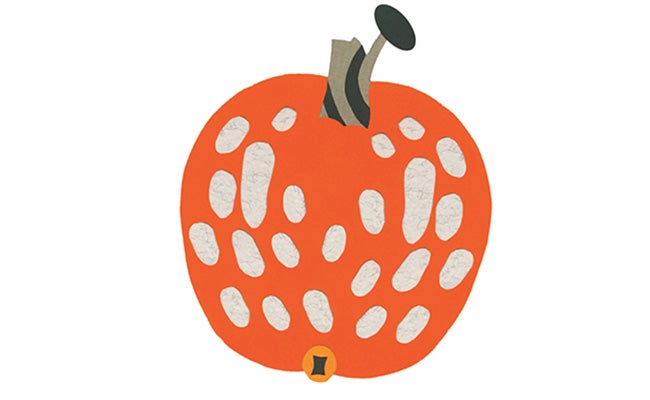The Worldly Apple | An ode to the British orchard
This article first appeared in the Folio magazine's Autumn 2014 issue. Sue Clifford and Angela King, founders of Common Ground, celebrate the history and variety of the apple in Britain.
How did it happen, that apples originating in the fruit forests of the Tien Shan in central Asia, as far from the ocean as can be, came to flourish on this sea-washed isle off mainland Europe?
There, in the Heavenly Mountains, bears and people must have gradually favoured the less sour fruits. Perhaps there grew a thriving trade in fruit and trees. But traders, as they trod the routes that would later become the Silk Road, must have spread trees to the Mediterranean and northern Europe without even trying, much as we now populate road verges in tossing away apple cores. Certainly by Neolithic times the eating apple had made landfall here.
Each apple pip brings novel progeny, so how did we learn to perpetuate favoured varieties? In The Georgics Virgil describes the magic of taking a twig to graft or bud onto a root stock so that ‘Presently / Up shoots a lofty tree with flourishing boughs, / Marvelling at its unfamiliar leaves / And fruits unlike its own . . .’ Imagine Court Pendu Plat, reputed to trace back to Roman times, being passed on down the generations. In the latter part of the 16th century the monastic cultivation of botanical specimens was brought to an abrupt end in Britain, but Henry VIII did cause orchards of cherry, pear and apple to be planted in Kent and the newly landed aristocracy followed his lead.
Once the Victorians got their teeth into cross-breeding, the apple became a focus of competitive questing for new varieties. A retired brewer from Bermondsey brought into existence the Cox’s Orange Pippin in Colnbrook; a vicar from Lincolnshire gave us Ellison’s Orange; the Laxton Brothers raised Lord Lamborne and many others, such as Laxton’s Epicure and Beauty of Bedford. These stories of emergent science and happenstance are part of our culture, as are the wonderful names.
Common Ground’s Apple Map of Britain, published on Apple Day 1993.
In the 1980s, Common Ground had been working hard to interest people in taking more care of trees in both city and country. Our fellow conservationists had a blind spot: they regarded all orchards as commercial, short-lived, intensive, profusely sprayed and hence hopeless for wildlife. Moreover, growers had bowed to the marketing onslaught of Golden Delicious from France and had countered by ditching many varieties coveted locally, and specialised instead in Bramley and Cox. And yet three thousand varieties of eating and cider apples had once been grown here in Britain. What could Common Ground do? We launched a campaign to Save Our Orchards and plant new ones, and in 1990, we invented Apple Day, holding the first ourselves in Covent Garden and then inspiring people across the country to celebrate annually in their own ways on 21 October, preceded by All Fruits Eve. We encouraged the revival and invention of apple games and customs, local recipes and seasonal activities, and we connected nature, landscape and tall fruit trees. In reasserting the things people were forgetting to value we fuelled a movement which brought grants for orchards, local researches, micro cider-making, hundreds of Community Orchards and celebrations of Apple Day, and demand for more locally grown varieties to be made available to buy. There are county and city organisations that actively promote good practice, wassailing has seen a great revival, and belated research into orchard loss has proved our point – nearly two-thirds of English orchards have been lost since the 1950s. There is still much to be done. In our small island the blossom, the bees, the beetles, the birds and the badgers need these places as much as we do. In orchards of tall trees humans have achieved an exemplary relationship with the world, one that is mutually beneficial and life enhancing. Orchards demonstrate how we could, and should, live with nature, as friends and collaborators.Explore our limited edition, The Herefordshire Pomona – the most comprehensive study of apples and pears in Britain ever undertaken.



